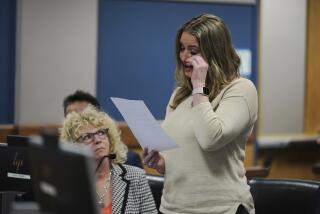Some Lawyers Use Ounce of Prevention
- Share via
What is it that lawyers do for a living, anyway? If you understand what lawyers do, then you’ll have a better idea how best to use them.
In law schools, students are trained to “think like lawyers” in the words of Prof. Kingsfield, the intimidating law professor in television’s “The Paper Chase.” That means they are trained to understand legal rules and regulations, decipher court opinions and then apply the implicit teachings in the legal rules and judicial opinions to specific factual problems.
Business people like to say that lawyers are trained to say “no . “ That’s because as part of their training, lawyers learn to see risks in everything. Most of a law student’s time is spent reading about legal disputes--what went wrong, not what went right. Lawyers learn very quickly that even the most harmonious partnerships and marriages can often end in disaster.
Too often, most people only go to see a lawyer when a business or personal situation has gone sour. So lawyers often seem to only see the negative side of a proposed business venture, an investment or a possible partnership. Actually, to be effective, lawyers learn to plan for such disasters.
There is a valuable lesson in understanding potential risks. Lawyers can help you prevent disasters or be prepared to handle them. And that’s when a lawyer is doing his or her job well--not saying “no,” but figuring out the best, least risky way of saying “yes.”
For example, when two friends decide to buy a yogurt shop together, the last thing on their minds may be failure. But a good lawyer will force them to think of a possible bankruptcy or a parting of the ways, and try to draft a partnership agreement that will set forth now--while they’re still friends--what will happen if the venture falls apart in a few years.
Of course, lawyers do much more than advise about business deals. But the same framework of analysis applies whether a corporate lawyer is advising a Fortune 500 company about antitrust liability, a solo practitioner is drafting a will for a widow or an entertainment attorney is suing a film studio for stealing his client’s script.
Consulting a lawyer can help you understand potential legal roadblocks you don’t even know exist. Preventive law, like preventive medicine, is an effort by some lawyers to bring clients into the law office regularly, before they have a specific question, and assess potential problems before they arise.
In these preventive law sessions, lawyers may discuss such issues as insurance, ownership of a home, investments, family planning, wills, savings accounts, decisions about extraordinary life-saving health care, credit and bankruptcy. These sessions should be with a lawyer who is an enthusiastic supporter of preventive law and experienced in the field.
Lawyers tend to look at their client’s world through dark glasses. Once you understand that, as a legal consumer, you’ll be better prepared to understand their counsel and accept their help.
Legal Brief
If you think the dishonest conduct of your lawyer has lost you money, and you’re patient, you may be able to get a reimbursement from the State Bar of California. The State Bar operates a Client Security Fund, which pays clients who have lost money or property because of the dishonest conduct of an attorney while acting in a professional or fiduciary capacity. For example, if your lawyer settles your case but you never see the check, you can ask for reimbursement. The fund does not cover negligence or malpractice claims against the lawyer.
The fund, financed by a $25 annual fee paid by all California lawyers, paid out more than $1.5 million on 182 claims in 1987. The maximum reimbursement is $50,000. Send application requests to 818 West 7th St., Los Angeles, Calif. 90017, or call (800) 843-9053.
Before a payment is made, the attorney must have been disciplined, resigned with disciplinary charges pending, died or been judged mentally incompetent. And that can take years.
More to Read
Inside the business of entertainment
The Wide Shot brings you news, analysis and insights on everything from streaming wars to production — and what it all means for the future.
You may occasionally receive promotional content from the Los Angeles Times.










